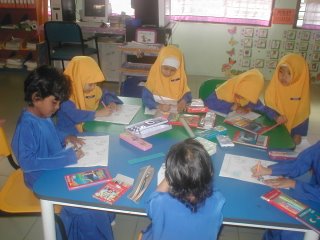Child Development
Child development provides parents with information on physical, mental and emotional growth and development in children. Child development information can help parents know when they are expecting too much from a child as well as become aware of lags in development that may benefit from professional help.
Monday, August 28, 2006

Play is vital to the development of all facets of the young child’s emerging self. Play supports children as they develop independence and achieve mastery and control over their environment. Through play, children invent, explore, imitate, and practice the routines of everyday living as a step in the development of self-help skills. The successful acquisition of these skills promotes children’s feelings of competence. Their emerging independence fosters the ability to make choices about everyday decisions, such as which book to read or whether to paint, play with dolls, or built with blocks. Children who are given opportunities to explore and experiment with non-stereotypical roles and behaviors are more likely to perceive a diverse range of personal and professional roles as possible options. When children enact a variety of roles through pretend play, they are more likely to see many possibilities for themselves and to make more informed decisions about choices available to them.
Play promotes the development of personal awareness in the following areas:
- Self-help skills
- Independence
- Personal health
- Personal safety
Play promotes the development these facets of emotional well-being:
- Awareness, acceptance, and expression of emotions.
- Coping skills.
- Personality intergration.
- Building values.
Play promotes the development of socialization in the following areas:
- Social interactions.
- Cooperation
- Conversation
- Respect for other
Play promotes the development of the facets of communication:
- Receptive language
- Expressive language
- Nonverbal communication
- Auditory memory / discrimination
Play promotes the development of cognition:
- Problem solving
- Concept formation
- Imitation / memory
- Association / classification
Play promotes the development of perceptual motor skills:
- Eye-hand / eye-foot coordination
- Locomotor skills
- Non-locomotor skills
- Body management and control
posted by Fauziah at
8:38 PM

0 Comments:
|


|




